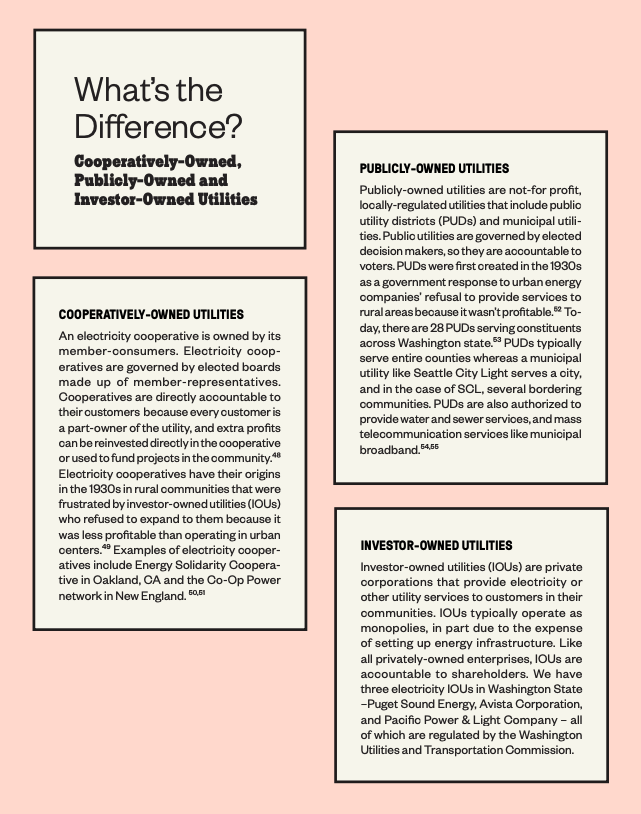-
What is the difference between publicly-owned, Cooperatively-owned and investor-owned utilities?
Publicly-owned utilities are not-for profit, locally-regulated utilities that include public utility districts (PUDs) and municipal utilities. Public utilities are governed by elected decision makers, so they are accountable to voters. PUDs were first created in the 1930s as a government response to urban energy companies’ refusal to provide services to rural areas because it wasn’t profitable. Today, there are 28 PUDs serving constituents across Washington state. PUDs typically serve entire counties whereas a municipal utility like Seattle City Light serves a city, and in the case of SCL, several bordering communities. PUDs are also authorized to provide water and sewer services, and mass telecommunication services like municipal broadband.
Cooperatively-owned Utilities. An electricity cooperative is owned by its member-consumers. Electricity cooperatives are governed by elected boards made up of member-representatives. Cooperatives are directly accountable to their customers because every customer is a part-owner of the utility, and extra profits can be reinvested directly in the cooperative or used to fund projects in the community. Electricity cooperatives have their origins in the 1930s in rural communities that were frustrated by investor-owned utilities (IOUs) who refused to expand to them because it was less profitable than operating in urban centers. Examples of electricity cooperatives include Energy Solidarity Cooperative in Oakland, CA and the Co-Op Power network in New England.
Investor-owned utilities (IOUs) are private corporations that provide electricity or other utility services to customers in their communities. IOUs typically operate as monopolies, in part due to the expense of setting up energy infrastructure. Like all privately-owned enterprises, IOUs are accountable to shareholders. We have three electricity IOUs in Washington State –Puget Sound Energy, Avista Corporation, and Pacific Power & Light Company – all of which are regulated by the Washington Utilities and Transportation Commission.
from page 56 of the Powering the Transition report
-
What is the Utilities and Transportation Commission (UTC)?
The UTC is a state-wide body that regulates for-profit, investor-owned energy, water, telecommunications, and transportation utilities and industries. Energy companies regulated by the UTC include Puget Sound Energy, Avista, Pacific Power, Northwest Natural, and Cascade Natural Gas. Three Commissioners are appointed by the governor and confirmed by the state senate, and they each serve six year appointments. To learn more, go to the UTC’s website at: https://www.utc.wa.gov/aboutUs/Pages/overview.aspx
Research:
- How Much Do Investor-Owned Utilities in Washington Profit From Ratepayers? (Puget Sound Sage)
- Powering the Transition: Community Priorities for a Renewable and Equitable Future (Puget Sound Sage)
- Washington’s Investor-Owned Utility Millionaire Executives (Puget Sound Sage)
- Who is Puget Sound Energy? (Puget Sound Sage)
- Utilities and Transportation Commission (UTC) authorized PSE’s shareholders a 9.4% return on equity (Fitch Ratings)
- Puget Sound Energy’s top four executives made almost $20 million last year (Puget Energy)
In the News:
- State extends moratorium on some electric, gas shutoffs. - The Bellevue Reporter
- Seattle looks at bigger cuts to police budget while activists reflect on unfulfilled promises. - The Center Square
- State Regulators Halt Power and Gas Shut-offs until April 2021 - South Seattle Emerald
- WA Groups Seek for Protections for Utility Customers as Crisis Lingers. - Public News Service
- AG Ferguson Calls on UTC to Protect Washingtonians From Utility Shut-Offs Amid COVID-19 Pandemic. - Big Country News Connection
- For the Third Time, Groups Ask Inslee to Keep the Lights On - The Stranger
- Will Inslee Keep the Lights On? - The Stranger

